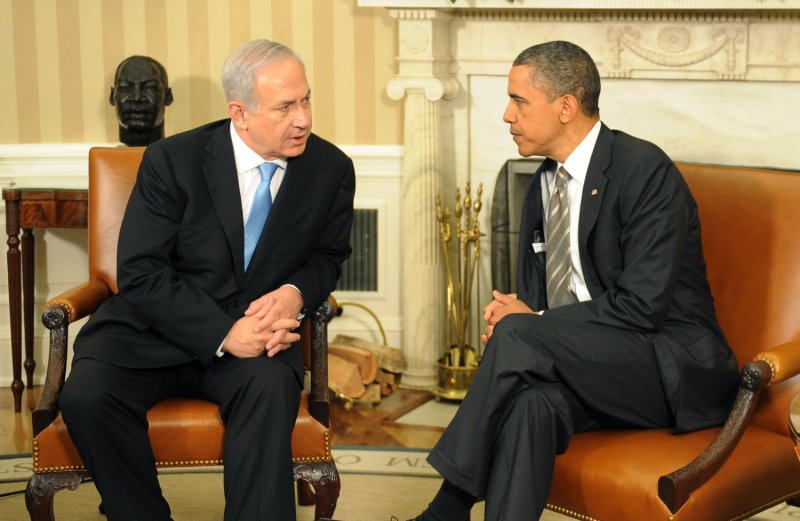U.S. President Barack Obama (R) and Israeli Prime Minister Benjamin Netanyahu discuss their differences in the Oval Office of the White House on May 20, 2011 in Washington, DC. UPI/Pat Benic |
License Photo
WASHINGTON, Sept. 15 (UPI) -- It was another critical moment in the life of the 63-year-old Jewish state. Egyptian mobs had breached the protective barrier around the Israeli Embassy in Cairo, shredded the national Star of David flag before stomping on it -- and the Israeli ambassador to Egypt and his staff fled town a few steps ahead of the mob.
The 1979 Israeli-Egyptian peace treaty is both the cornerstone and guarantor of normal relations between the two countries, locked in by the United States with annual military assistance to Israel of $3 billion and to Egypt of $1.3 billion.
The entire package is now at risk if the U.S. Congress decides that Egypt has, in effect, scuttled the peace treaty with Israel. The current Egyptian military government may have anticipated that November's elections may produce a near majority for the redoubtable Muslim Brotherhood.
In Jerusalem, Israeli Prime Minister Binyamin Netanyahu was toying with the idea of sending Michael Oren, the U.S.-born Israeli ambassador to the United States, to Cairo in an attempt to repair the tattered peace treaty.
Adding insult to injury, Turkish Prime Minister Recep Tayyip Erdogan demanded an apology from Israel following a U.N. report that blamed Israel for the killing of nine Turkish "activists" when Israeli commandos stopped the Gaza flotilla last year.
When Israel declined to apologize, Erdogan suspended military and trade ties with one-time close friend and flew off to Egypt to address the Arab League, accompanied by a score of ranking Turkish military and civilian officials.
Spurned by two critically important partners -- Turkey and Egypt -- Israel now had to face a form of diplomatic torture at the U.N. General Assembly in New York.
U.S. Secretary of State Hillary Clinton mobilized America's diplomatic firepower to head off disaster for both the United States and Israel at the United Nations next week. The Palestinians are determined to force a vote that would recognize the "state of Palestine" as the 195th member state.
Canada, Latin America, Africa, the Middle East, Asia and Europe favor full membership for Palestine. In the U.N. Security Council, there are 15 members -- five of them with veto-wielding power (United States, United Kingdom, France, Russia and China) -- and the United States would almost certainly veto a resolution recognizing Palestine as a full-fledged member state.
In the U.N. General Assembly, with its 195 members, the best the Palestinians could hope for is a promotion from observer status to some form of diplomatic gobbledygook that would declare Palestine to be a non-member state.
Monaco, the size of New York's Central Park, with Monte Carlo as its capital, has been a U.N. member since 1990. Vatican City with a population of 771 (including the pope) maintains diplomatic relations with 106 countries but isn't a U.N. member state. The co-principality (France and Spain) of Andorra tucked away near the top of the Pyrenees mountain range, with 84,000 people, is a member. Kosovo is still waiting to become one. Taiwan was one but is no longer, displaced by China in 1971.
A simple solution for the Palestinian dilemma is for all nations -- including the United States and Israel -- to vote in favor of Palestine as a full-fledged member. Everyone, including Israel, has agreed that the West Bank, occupied by Israel since it defeated Egypt, Syria and Jordan in the 1967 Six Day War, is to become a Palestinian state. No argument there.
The argument is over size: East Jerusalem (with 200,000 Jewish settlers) as the Palestinian capital, is firmly rejected by Israel; 140 Jewish settlements in the West Bank with a total population of 330,000 that keep expanding; and an Israeli-manned security cordon along the Jordan River, which is also the Jordanian frontier, and induces Palestinian feelings of claustrophobia.
Israel knows it cannot continue to occupy the West Bank indefinitely as this can only lead to a South African-type of apartheid with Bantustans (areas where the whites ordained the blacks should live).
For the United States to isolate itself with Israel against the rest of the world has the makings of a "Gunga Din" saga with Cary Grant and Douglas Fairbanks. But it makes little geopolitical sense. Palestinian sovereignty and Israeli security aren't incompatible. But the humdrum shuttle diplomacy of former U.S. Sen. George Mitchell, D-Maine, was doomed to fail. There's only one Henry Kissinger and his brand of shuttle diplomacy performed diplomatic miracles.
What is needed now is statesmanship of the highest caliber.
U.S. President Barack Obama has demonstrated that's not his strong suit.















